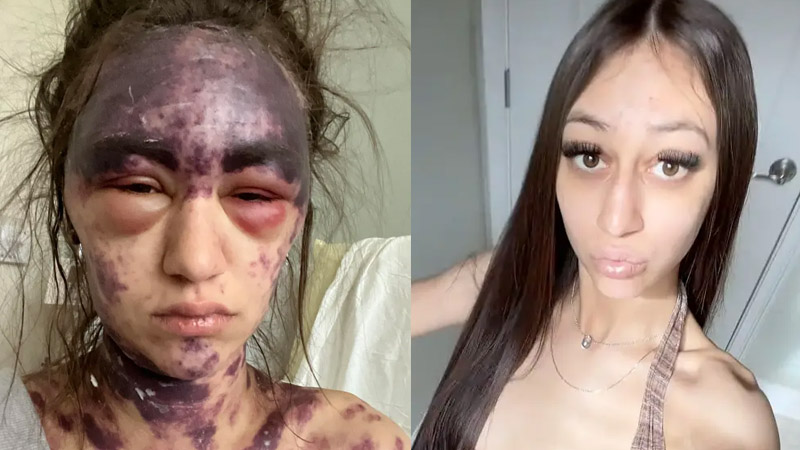Florida Woman Blinded and Bruised After Receiving Multiple Vaccines Before Transfusion for Rare Disorder

Todd Lorenze/Facebook
A 23-year-old Florida woman, Alexis Lorenzo, was left temporarily blinded and severely bruised after being required to receive multiple vaccines before undergoing a blood transfusion for a rare autoimmune disorder. Lorenze, diagnosed in January with Paroxysmal Nocturnal Hemoglobinuria (PNH), traveled to California earlier this month for a transfusion to treat the condition, which affects approximately one in a million people.
PNH is a rare disorder in which the immune system attacks and destroys red blood cells, leading to anemia, fatigue, and other complications. Upon arriving at UCI Medical Center in California, Lorenze claims that doctors informed her she would need to receive vaccines for tetanus, pneumonia, and meningitis before the transfusion could proceed.
Lorenze reported that just 10 minutes after receiving the three vaccines simultaneously, she began experiencing alarming symptoms. Her vision darkened, her jaw locked, and she began vomiting. Her body swelled and bruised in the hours that followed, prompting significant concern about her condition.
Medical experts have raised concerns about the risks of administering multiple vaccines at once, especially to patients with autoimmune conditions like PNH. These patients can experience heightened immune responses, which can lead to severe complications such as cytokine storms, where the body’s immune system attacks its own healthy tissues and organs.
This reaction can be life-threatening and cause irreversible damage. “While it’s usually safe for most people to get these vaccines together, in her case, the immune response could have been too much and led to complications,” said Dr. Raj Dasgupta, chief medical advisor for Fortune Recommends Health, in an interview with Daily Mail.
He added, “To avoid overloading her system, it would be reasonable to space out the vaccines and closely monitor for any worsening symptoms.” Though some doctors believe that the vaccines were not the direct cause of Lorenze’s severe reaction, they suggested that her unstable PNH condition may have contributed. The vaccinations could have triggered a flare-up or an allergic reaction.
“PNH can flare up on its own, and we have to consider whether the condition itself is behind her severe reaction,” Dr. Dasgupta explained. “Both factors—her PNH and the vaccines—need to be carefully weighed when examining what’s happening.”
The case has sparked debate about the necessity of vaccines in Lorenze’s situation. Vaccines for meningitis and pneumonia are often recommended for high-risk groups, particularly those undergoing immunotherapy or other treatments that may weaken the immune system. However, several experts have questioned whether the vaccines were genuinely necessary before her transfusion.
Lorenze, who shared her story through viral TikTok videos, revealed that she hadn’t received any vaccines since childhood. Her family claims the hospital insisted the vaccinations were mandatory for the transfusion, but some medical professionals argue that this is not a typical requirement. As Lorenzo continues to suffer from pain and swelling, her family is seeking to transfer her to a private hospital in Los Angeles for further treatment.


